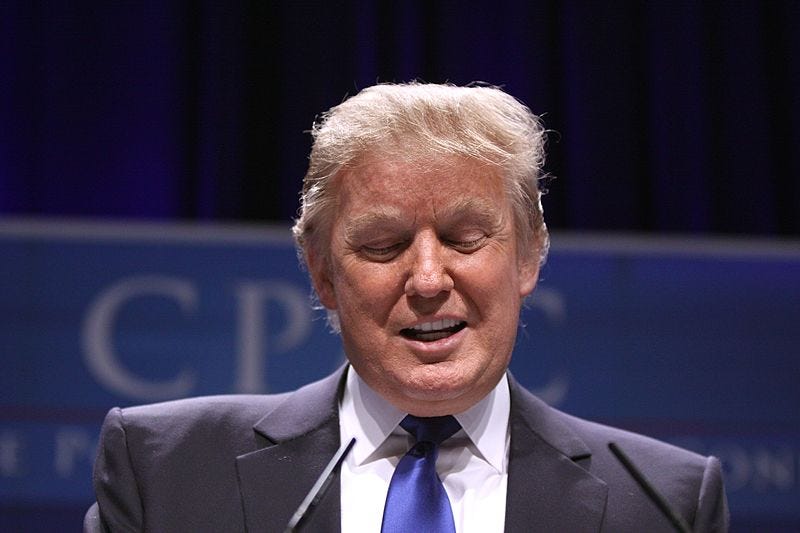Saucer-Plus: Don’t be Fooled Republicans, Trump Still Can’t Win
President Biden's electoral weaknesses are real, but Donald Trump's brand of chaos and his similar unfavourability among voters would distract from rather than highlight those weaknesses.

Joe Biden is in a precarious position. His approval rating in the Real Clear Politics polling average stands at a dismal 40.6%, with 55.4% disapproval, as of November 28th, 2023. Historically, this is a terrible place for an incumbent to be heading into an election year. His approval on the economy, always the biggest issue in an election, is even worse, at 38.4%. The President is old and, more importantly, looks and feels old. He has presided over a period of historically high inflation and no less than three foreign policy disasters that have weakened America’s position on the world stage.
Little wonder, then, that Americans are starting to look for alternatives. It should be no surprise that he is losing to Ron DeSantis and Nikki Haley in general election polling averages. What is surprising is that he is also losing to Donald Trump. However, this is an illusion. Republican primary voters should not fall for it when going to the polls in three months. They should make no mistake—Donald Trump is the biggest obstacle to Republicans returning to power in 2024.
Polling is one thing, but election results matter more. After a pitiful midterm, Republicans have fared as poorly in special elections in 2023. Democrats have won these by an average of 11 points higher than the weighted relative partisanship of their districts.
Republicans did not do well in off-year general elections, either. Democrats took full control of the Virginia statehouse. In deep-red Kentucky, Democratic Governor Andy Beshear dominated his challenger, state Attorney General Daniel Cameron, winning by 26 points and carrying 12 more counties than he did in 2019. Cameron had been considered a rising star in the Republican Party, but his future is now uncertain.
Meanwhile, in Ohio, a traditional battleground but a state Trump carried by eight points twice, a Democratic-backed measure to enshrine abortion rights into the Ohio Constitution won by 12 points. In Pennsylvania, arguably the most important battleground state in the post-2016 political landscape, a Democratic candidate won the state’s Supreme Court election. Even in Mississippi, incumbent Republican Governor Tate Reeves only held on by three points against his Democratic challenger.
The only bright spot for Republicans came in the same surprising place as last year, in deep blue New York. There, Republican challenger Kristy Marmorato defeated Democratic incumbent Marjorie Velázquez in a Bronx New York City Council race. Republicans also did well in other local races across the state.
A deeper analysis requires one to ask an obvious question: how is a President as unpopular as Biden presiding over such electoral success for his party? Given his approval rating, the opposition party should be romping to victory in races all across the country.
The answer is twofold. First, the Supreme Court’s Dobbs decision undoubtedly harmed the Republican Party’s electoral prospects. In Justice Alito’s majority opinion, he noted that the Court was returning the power to weigh abortion-related arguments “to the people and their elected representatives.” It is hard to argue that the people have not spoken in 2022 and 2023. It is likely not a coincidence that Republicans have done well in New York—abortion rights are codified into state law. Therefore, voters are less worried about losing them and more concerned about other issues, especially crime.
While it is hard not to argue that abortion is harming Republicans in competitive races and even in red states, Donald Trump’s leadership of the party is the other drag. In 2022, almost all his endorsements in key Congressional, Senate, and gubernatorial races lost their general election bids. The ones that did not, such as Ted Budd in North Carolina and JD Vance in Ohio, underperformed. This trend repeated in 2023. Daniel Cameron was endorsed by Donald Trump and lost in a deep red state. Tate Reeves was endorsed by Donald Trump and underperformed his state’s partisan lean by eight points.
Donald Trump’s favorability rating is even lower than Joe Biden’s, although it is close, at -15 to -14.7, respectively. However, this comes at a time when most people are enjoying the holiday season and not paying close attention to politics, when Donald Trump is not in the spotlight of a political campaign, and before his almost certain conviction of the dozens of felony charges he faces across four separate criminal cases in New York, Georgia, and Washington DC.
Perhaps the most critical consideration for Republican primary voters is whether Donald Trump is stronger among key voting demographics now than in 2020. That year, Biden won 54% of suburban voters, an improvement by nine points over Hilary Clinton in 2016. Trump won white suburban voters, traditionally the Republican Party’s strongest demographic, by only four points. Biden won 57% of white college-educated voters and improved by seven points over Clinton among men. He also did ten points better among independents.
Given Donald Trump’s growing problem with suburban voters and men, his notorious unfavorability among women, and an independent voter base that saved the day for Democrats in 2022, is it likely that an older, more belligerent, and convicted felon Donald Trump will do better among these demographics in 2024 than in 2020? Reasonable readers should know the answer.
Joe Biden is a historically weak incumbent. There is ample evidence to suggest that if the Republican Party nominates someone else—anyone else—it will have the opportunity to win and win big (provided that the candidate makes a pledge to not impose federal abortion restrictions). The condition the public demands for this support, however, is that the party must oust Donald Trump as its leader.
Will Republican primary voters get this message? A year ago, after a midterm defeat that can only be described as a humiliation, it looked like they might, especially in the wake of Ron DeSantis’ 19-point landslide reelection in Florida. However, Donald Trump’s subsequent indictments produced a rally-around-the-leader effect. The indictments were well-timed.
The Nobel Laureate psychologist Daniel Kahneman said, “Nothing in life is as important as you think it is while you are thinking about it.” This phenomenon has come to be called the Focusing Illusion, where humans can often inflate the importance of a trivial matter just because we are thinking about it. Democrats have used this principle to great effect and plan to do the same in 2024. They want voters to think about Donald Trump, his grating personality, and his multiple criminal indictments (and likely convictions). They do not want voters to think about Joe Biden’s less-than-stellar performance in the White House.
The strategy has been proven to work throughout Trump’s time as leader of the Republican Party. Will it work again in 2024? This time, for Democrats, it requires a cooperative adversary. The only question remaining is: will Republican primary voters prove as cooperative as Biden and his party are hoping for?
Jordan Carpenter received his BA in Political Science from Fordham University in 2011, with coursework in international law, political theory, and political ethics. He was Assistant to the President at New York Civic, under Henry Stern, from 2012 to 2017 and is currently a script writer for The Military Show on YouTube.



